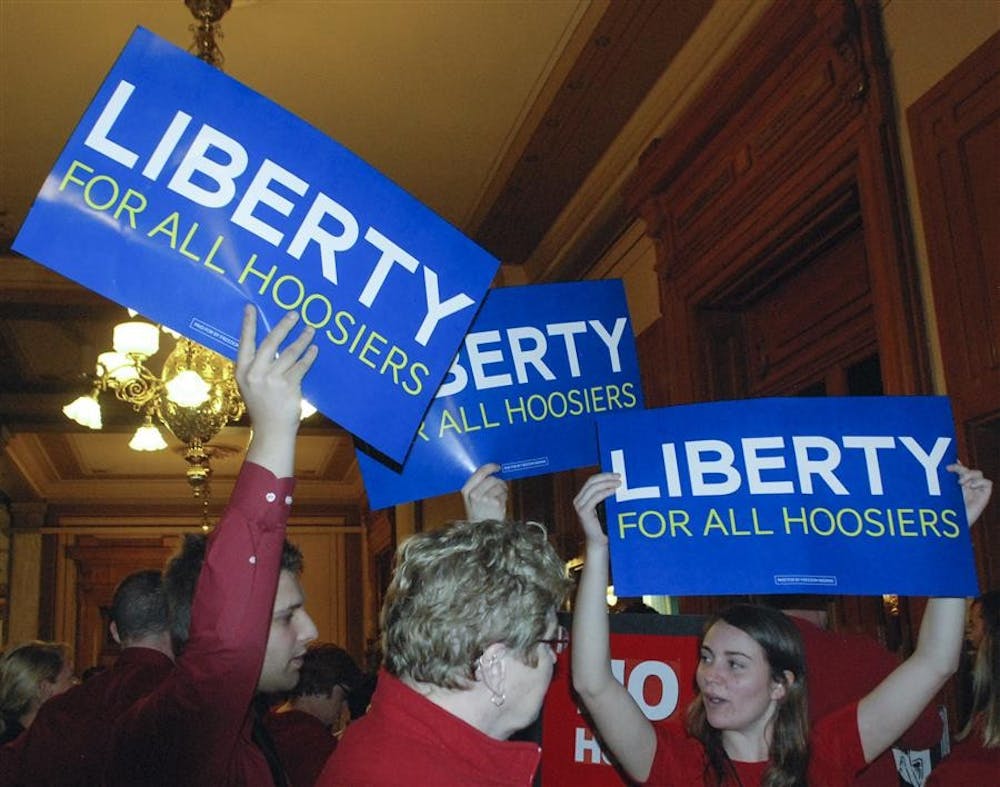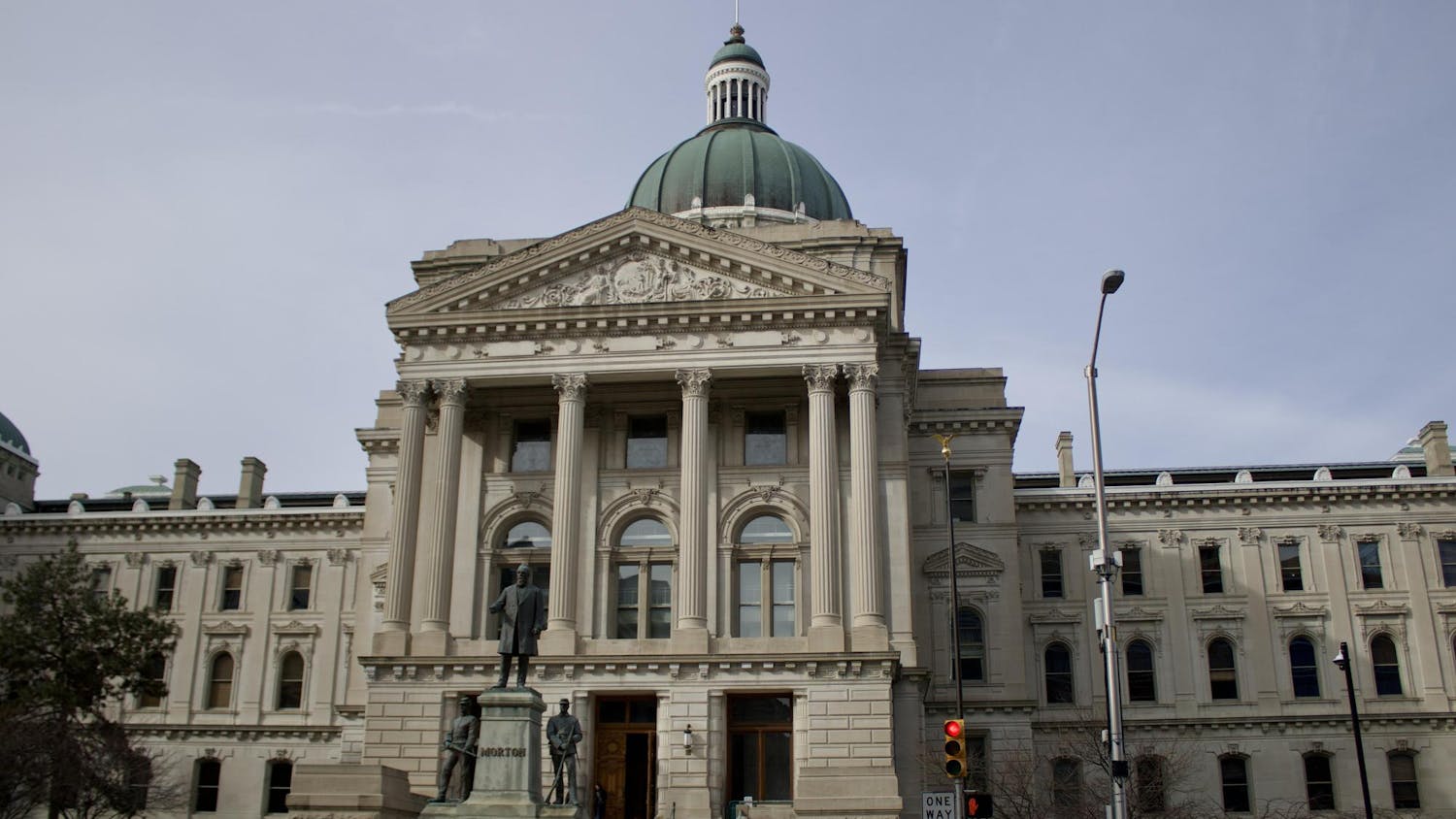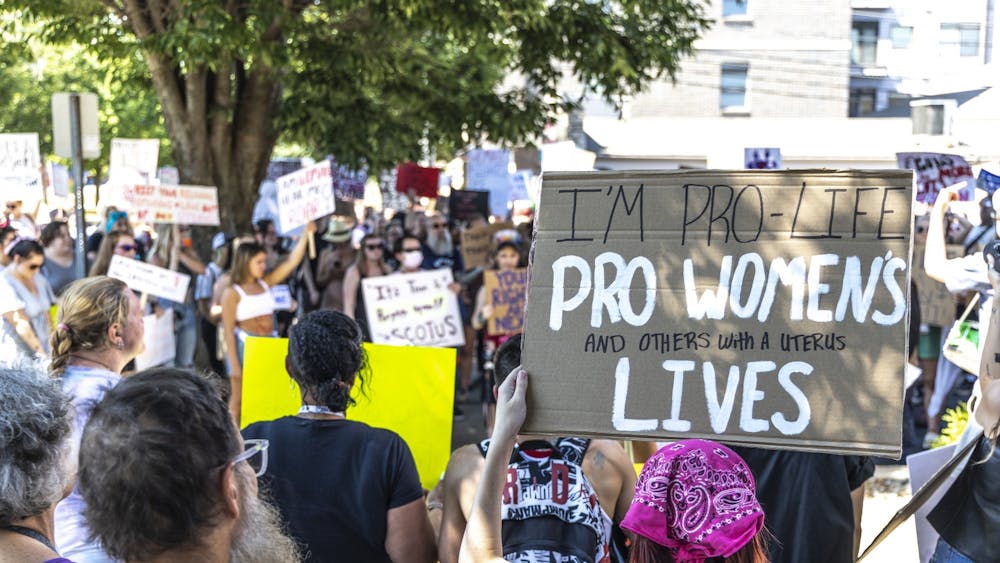INDIANAPOLIS – After hearing almost four hours of testimony Monday, a state legislative committee delayed the first in a series of key votes that could put a constitutional amendment banning same-sex marriage in front of Indiana voters this November.
Supporters and opponents of the amendment, House Joint Resolution 3, and House Bill 1153, a clarification of the amendment’s purpose and language, presented experts to give testimony before the state House of Representatives Judiciary Committee and a packed crowd of onlookers from both sides of the debate.
When seats in the House Chamber were filled, onlookers packed the hallway outside the room, watching on TV screens, often side by side with people who wanted an entirely different outcome from the hearing.
H.J.R. 3 has two provisions: The first reaffirms the existing state statute that only heterosexual marriages are recognized in Indiana, and the second prohibits creating a legal status “substantially similar” to marriage, such as civil unions.
The Judiciary Committee vote, which was expected to take place Monday, but will now be rescheduled for a yet unannounced date, would allow the full House to consider H.J.R. 3. After the House, a Senate committee and the full Senate could vote on the resolution.
Indiana law already bans same-sex marriage, but putting it in the constitution makes it considerably harder to overturn because amending the document requires overcoming several hurdles.
An amendment must be approved by the state House and Senate in two successive legislative sessions and then win support from the majority of voters in the next election. Nullifying an amendment requires the same process.
By contrast, existing laws defining marriage would require only a new law to be passed or for a state judge to declare the law unconstitutional.
“This amendment simply protects state statute,” Turner said.
Even though the ban already exists, opponents say an amendment will hurt the state’s public perception.
“It actually matters little how voters vote on this amendment,” Eli Lilly Senior Vice President Stephen Fry said. “The damage to our reputation will be done.”
In recent months, businesses and other large organizations, including IU, have expressed concern about the latter provision, saying it could make recruiting employees difficult.
“We will be reluctant to continue to add jobs in Indiana if our state is less welcoming and inclusive to employees,” Cummins Vice President Marya Rose said in her testimony.
Cummins and IU worry their policies of allowing same-sex partners of employees to receive health benefits could be in jeopardy if the amendment passes.
“I advised the president of IU that there is a high likelihood that IU would be sued to stop providing those benefits,” IU Vice President and General Counsel Jackie Simmons said in the first testimony of the day. “I also think there’s a high likelihood IU could lose.”
But supporters of the amendment say these concerns are unfounded, that the amendment was never intended to interfere with the benefits companies and universities provide for their employees or their families. That’s why H.J.R. 3 author
Rep. Eric Turner, R-Cicero, wrote H.B. 1153.
It says the marriage amendment is not intended to interfere with employee benefits, including for state entities like IU, or the adoption of state or local laws to “protect or provide for the property, health or safety of unmarried persons.”
Supporters testified mostly about the role of marriage and its historical roots and urged the committee to put the amendment on the ballot for Hoosier voters to decide.
Ryan Anderson of the Heritage Foundation, a think tank based in Washington, D.C., said the primary purpose of marriage is the wellbeing and positive upbringing of children, and allowing same-sex marriage changes that focus to “adult desires.”
If the amendment does not pass, nothing will change about the state’s existing ban on gay marriage, but opponents are concerned it could take years to overturn it if it does make its way into the constitution.
“We support H.J.R. 3 as a means to defend the nature of marriage as a union between one man and one woman,” said Glenn Tebbe, executive director of the Indiana Catholic Conference.
Meanwhile, outside the House chamber, supporters and opponents of the amendment watched the hearing. Most opponents held signs furnished by Freedom Indiana, a nonprofit dedicated to stopping H.J.R. 3 from passing. Supporters wore buttons and held signs demanding the amendment be put on the ballot for voters to have their voices heard.
Though there were no major incidents, the tense environment outside the House Chamber led to several small conflicts between advocates from the two sides. One man was ejected from the chamber during the pro-amendment testimony. Amidst cheers, laughs and retorts, the environment was tense.
Students and staff from Freedom Indiana’s IU affiliate made the trip up from Bloomington to stand alongside volunteers from around the state.
“This bill promotes discrimination,” Kayla Davenport, a volunteer from Lafayette said. “It promotes an environment of discrimination. It’s not conducive to an environment I would like to see in Indiana.”
If the House and Senate support the amendment and it goes before voters on the November ballot, Davenport said she’ll continue advocating for its defeat.
Just a few yards to Davenport’s left, Jocelyn-Tandy Adande, president of the African American Republican Council of Marion County held a “Vote yes on H.J.R. 3” sign.
“As a black female, I’ve been discriminated against all my life,” she said.
But for Adande, same-sex marriage is not about discrimination. It’s about declining morality.
“I don’t want to live in Sodom and Gomorrah in Indianapolis, Ind.” she said. “They say the climate has changed on this issue. Let’s hear from all the voters in 92 counties.”
This amendment and ones like it have been considered in the General Assembly for 10 years.
The Senate has passed similar amendments six times, and the House has passed it twice, but the full list of requirements to amend the constitution has yet to be completed.
The current amendment passed both houses by overwhelming majorities in 2011. At the time it was called H.J.R. 6.
If any of the votes this session fail, supporters will have to start fresh during the next legislative session, which begins in January 2015.
“We’ve been debating this since 2004,” Turner said. “It’s time to put it to rest, put the debate to rest.”
Follow reporter Michael Auslen on Twitter @MichaelAuslen.
Committee stalls marriage ban vote

Get stories like this in your inbox
Subscribe





